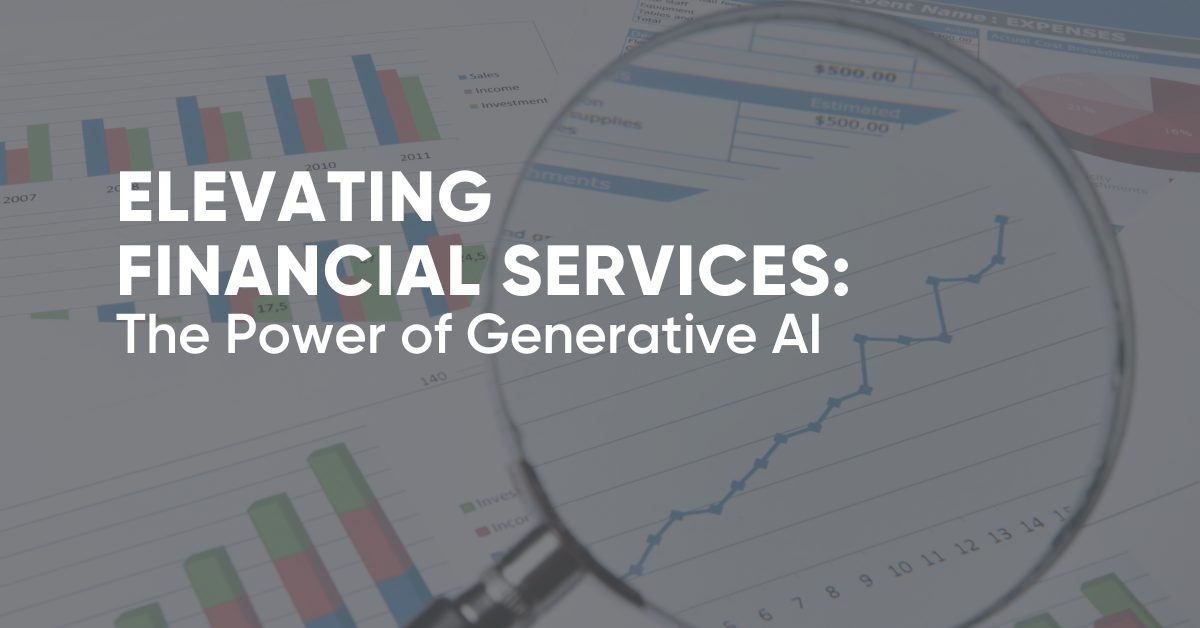HIGHLIGHTS
- GenAI is already improving operations for Financial Services Organizations
- Personalization services via AI are increasing customer satisfaction
- Fraud Detection and Risk Analysis are streamlining operations and increasing margins
- New GenAI use cases are evolving
The financial services industry is undergoing a significant transformation with the integration of generative artificial intelligence (GenAI) tools. Generative AI, with its ability to create, innovate, and analyze vast amounts of data, is revolutionizing the way financial institutions operate, deliver services, and mitigate risks. From personalized customer experiences to enhanced fraud detection, generative AI is reshaping the landscape of financial services, offering a wide range of benefits and opportunities.
- Personalized Customer Experiences: Generative AI algorithms enable financial institutions to gain deep insights into customer behavior, preferences, and needs. By analyzing transaction history, online interactions, and demographic data, AI-powered systems can deliver highly personalized recommendations, offers, and financial advice. For instance, JPMorgan Chase utilizes generative AI to provide personalized investment strategies to its clients, leading to improved customer satisfaction and engagement.
- Fraud Detection and Prevention: Generative AI algorithms can analyze large volumes of financial data in real-time to detect suspicious activities and potential fraud. By continuously monitoring transactions, patterns, and anomalies, AI systems can identify fraudulent behavior and alert financial institutions for prompt action. Mastercard’s AI-powered fraud detection system, for example, uses generative AI to analyze transaction data and identify fraudulent activities, reducing financial losses and protecting customer assets.
- Risk Assessment and Compliance: Generative AI tools assist financial institutions in assessing risks and ensuring compliance with regulatory requirements. AI algorithms can analyze vast amounts of data, including financial statements, market trends, and regulatory changes, to identify potential risks and optimize risk management strategies. Goldman Sachs, for instance, leverages generative AI to analyze financial statements and assess credit risks, enabling more accurate risk assessments and improved decision-making.
- Trading and Investment Strategies: Generative AI plays a crucial role in developing trading and investment strategies. By analyzing market data, historical trends, and news sentiment, AI-powered systems can identify patterns and generate insights to support investment decisions. Hedge funds like Renaissance Technologies have successfully implemented generative AI algorithms to develop sophisticated trading strategies, resulting in higher returns and improved portfolio management.
- Customer Service and Chatbots: Generative AI-powered chatbots and virtual assistants are transforming customer service in the financial services industry. These AI systems can provide instant support, answer customer queries, and assist in transactions, leading to faster response times and enhanced customer experiences. Bank of America’s virtual assistant, Erica, leverages generative AI to offer personalized financial guidance and support to its customers, increasing customer engagement and satisfaction.
- And more: We are still in the early days of understanding everything that GenAI can do for a business. New use cases are being developed at a breathtaking rate, as well as groundbreaking customizations of already-available GenAI tools.
More Examples
Capital One: Capital One employs generative AI algorithms to improve its fraud detection capabilities. By analyzing transactional data and customer behavior, Capital One’s AI system can identify potentially fraudulent activities and take immediate action to mitigate risks. This proactive approach has significantly reduced fraud losses and enhanced the security of customer accounts.
PayPal: PayPal employs generative AI algorithms to combat money laundering and fraudulent activities. By continuously monitoring transactions and analyzing patterns, PayPal’s AI system can detect suspicious activities and flag potential risks. This robust fraud detection system has helped protect both customers and the integrity of the financial ecosystem.
Generative AI is revolutionizing the financial services industry by enabling personalized customer experiences, enhancing fraud detection capabilities, improving risk management strategies, and optimizing investment decisions. With its ability to analyze vast amounts of data and generate valuable insights, generative AI empowers financial institutions to deliver innovative services, improve operational efficiency, and mitigate risks effectively.
As the financial services industry continues to embrace generative AI, the potential for advancements and new use cases is boundless. By leveraging this powerful technology, financial institutions can stay ahead in a highly competitive landscape, provide superior customer experiences, and drive innovation across the industry.

